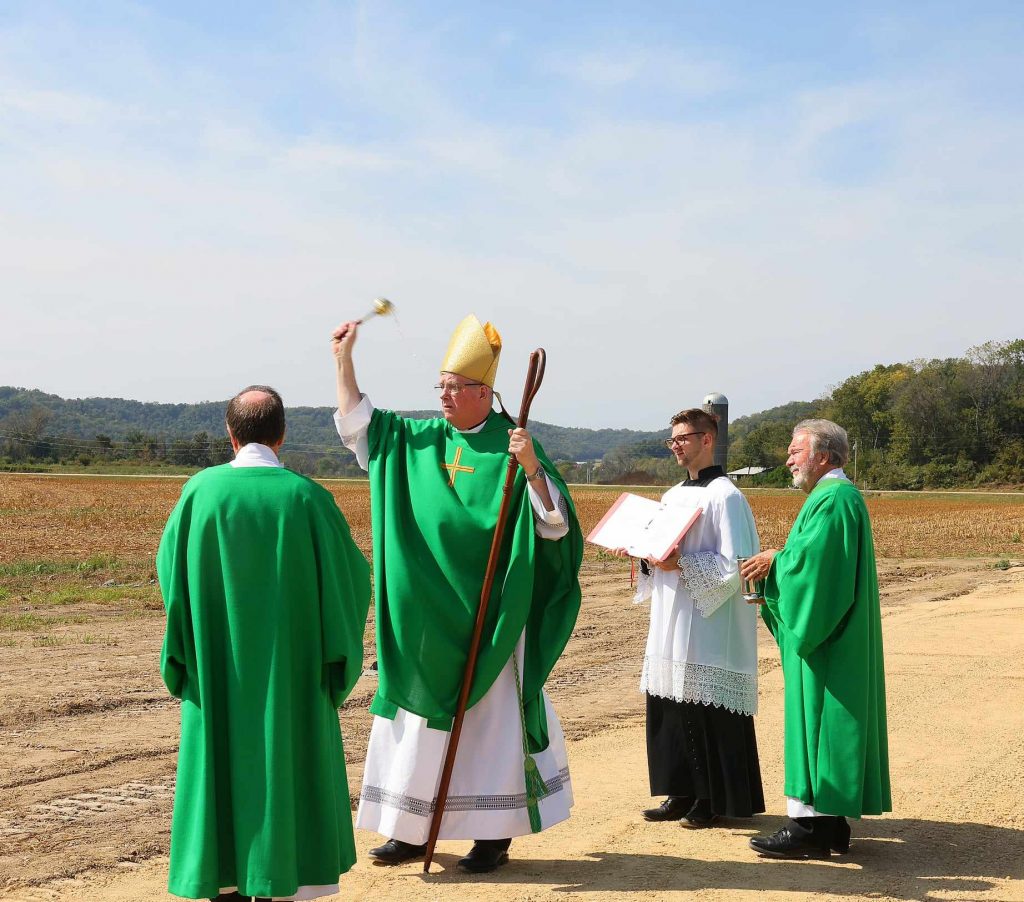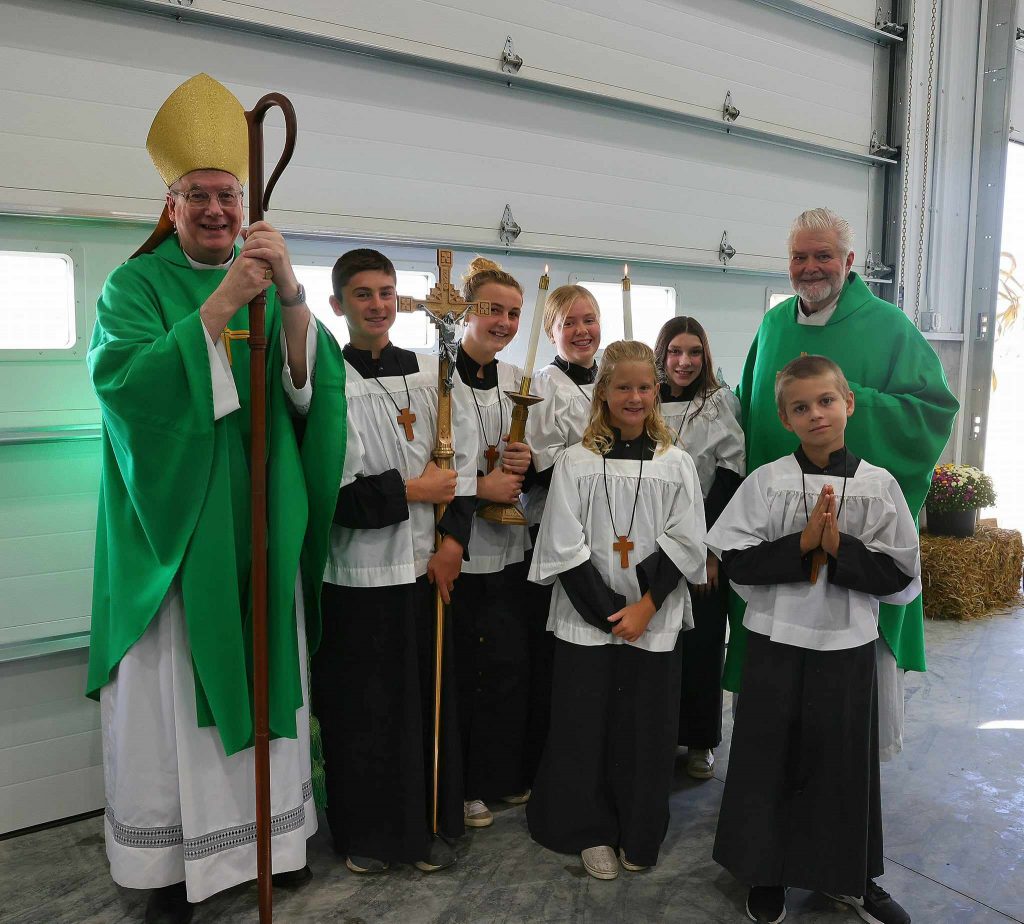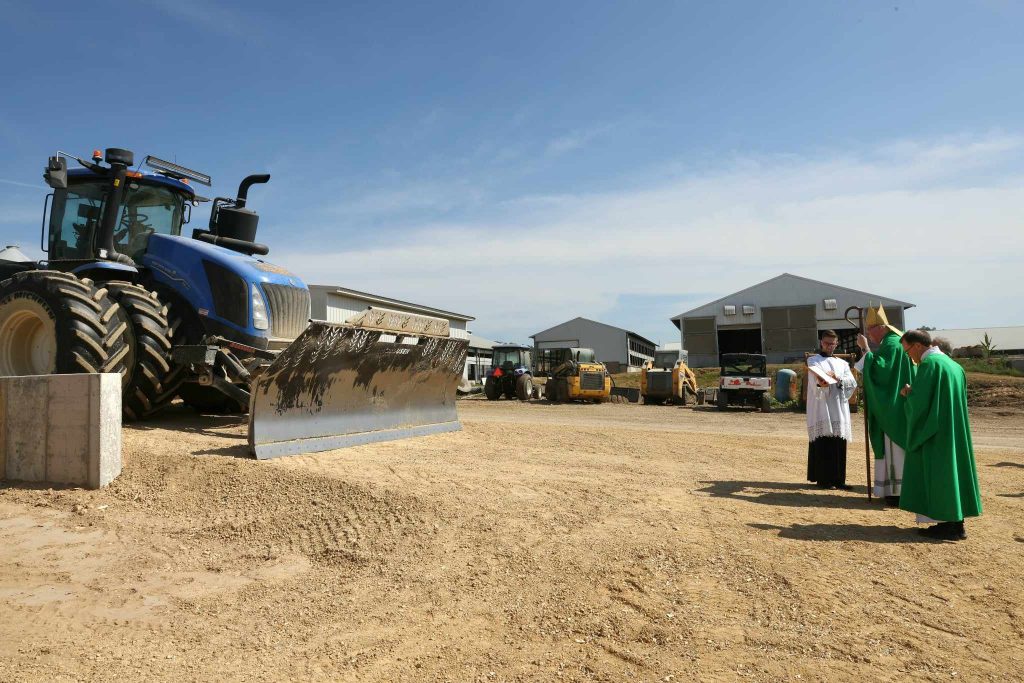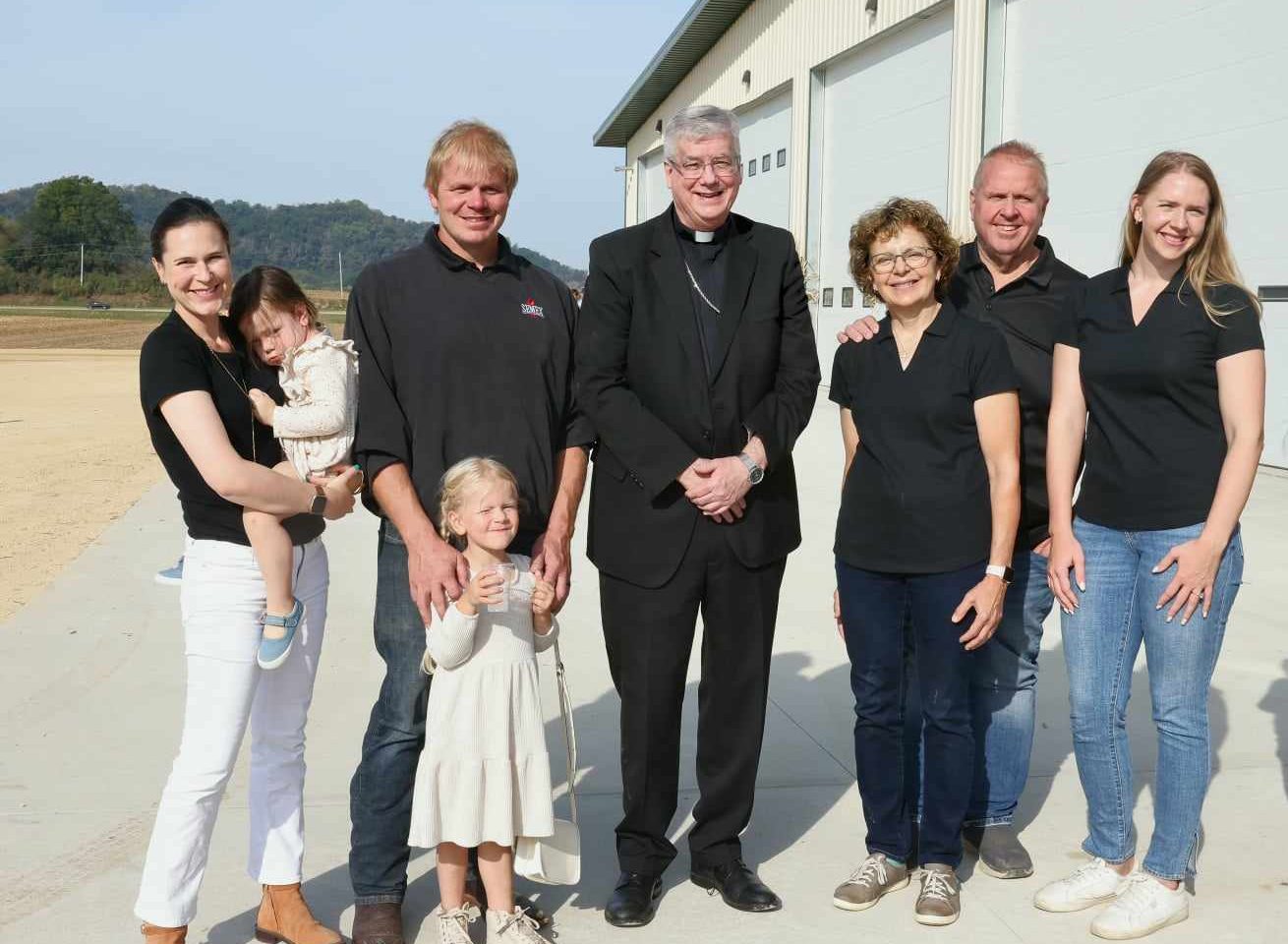Schmidt Dairy welcomes Bishop Battersby for a day of prayer and fellowship.
It’s not every day that the bishop pays your farm a visit. For Randy and Shelly Schmidt, owners of Schmidt Dairy near Gotham, Wis., that visit occurred on Sept. 18 during Rural Life Day 2024. When Bishop Battersby arrived at 8 a.m. that morning, Randy and Shelly weren’t quite sure what to expect. The bishop had been recently installed in May, and this was their first chance to spend some time with him in person. Growing up in the city of Detroit, Mich., where factories are more plentiful than farms, there were some doubts about whether the bishop would have any knowledge of, or experience with, dairy farming.
After introductions and greetings all around, the bishop climbed into a UTV with Randy, Shelly and their son Ryan for a tour of the farm. Soon, Randy’s and Shelly’s worries about relating to this bishop from Detroit vanished completely. As it turned out, Bishop Battersby had done his homework. Randy was “blown away” by how much Bishop Battersby knew about the business and day-to-day practice of dairy farming. He was impressed by the bishop’s humbleness and humility, describing him jokingly as “the least-intimidating intimidating man I know.” For his part, Bishop Battersby seemed genuinely pleased to be touring the farm on that beautiful summer day.

The Schmidt family has been farming in the United States since they emigrated from Germany in the 19th century. They purchased the land they currently farm in the 1950s, and since then, five generations of Schmidts have worked the land. Today, Randy and Shelly manage the farm along with their son Ryan and his wife, Chrissy. They employ more than 40 staff members who assist with the daily operations of the farm. Their dairy operation has expanded to about 4,000 head of cattle and features a modern rotary milking parlor.
Bringing God and Farmers Together
Later that day in his homily, Bishop Battersby spoke about feeling connected to the food chain through his connection to the farmers he has been able to meet over the years. Randy himself spoke about partnerships established with the surrounding cheese factories, groceries, equipment vendors and other businesses that were dependent on the viability of his farm. Rural Life Day seeks to emphasize the cooperation between God, the Catholic community and the farming community. As Randy expressed it, “We nourish people—the same way that the bishop does. He nourishes people.”
The connections created by the Schmidt farm business and the Catholic community began to bring people together that morning. Approximately, 350 to 400 attendees showed up for the morning Mass, including vendors, employees and neighboring farmers. Schmidt Dairy employees were also invited to participate. While some were Catholics and others were not, everyone enjoyed the beautiful liturgy.
For the Mass, the Schmidts transformed their new shop by clearing out space and setting up seating for everyone. They laid a slab of plywood across two sawhorses on the balcony and draped it with linen to create an altar. Several priests and deacons came to celebrate with Bishop Battersby, including Monsignor Roger Scheckel and Deacon Donald Tully from the Schmidts’ home parish of Assumption of the Blessed Virgin Mary in Richland Center. Monsignor Scheckel and Deacon Donald Tully, as representatives of the sponsoring parish, aided in organizing this event, as well as Shelly’s sisters and brothers, who were instrumental in site preparations and participated as ushers for the Mass.

Ninety students from St. Mary School in Richland Center filled two bleachers. The St. Mary’s choir performed the hymns, and Shelly expressed that when they sang, “it was just like hearing the voices of angels.” The Schmidt family also participated; their daughter Courtney read the first and second readings, while Ryan and Chrissy brought up the gifts along with their daughters, Lilly and Addie. After the Mass, Shelly’s sister, Vicki Peckham, did another reading. Shelly remarked that “we were all one people there” and emphasized that the Mass was “very evangelistic to our community, which we all need.”
Recognizing the Farmers of the Richland Center Deanery
After the Mass, the Rural Life Committee provided an update on several of their projects, including Project Milk, which has just celebrated its 40th anniversary (See Catholic Life Magazine, pp. 24-25, Nov./Dec. 2024). Project Milk is a Rural Life Committee initiative that strives to collect enough money every year to send a 40,000-pound shipment of dried milk to Casa Hogar, an orphanage in Peru founded by the late Father Joseph Walijewski. During the Mass, a collection was taken up that was entirely dedicated to Project Milk.
The attendees were able to watch a video during lunch that showcased how the donations from Project Milk were used at Casa Hogar and elsewhere in Peru. Randy and Shelly were proud to announce that the corporate sponsors covered lunch for everyone and that free-will lunch donations would go directly to Project Milk. On that day, nearly $5,000 was raised.
Next, the Rural Life Committee presented various awards to farmers in the Richland Center Deanery. One could say the theme of the day was family farmers—those farmers who live, pray and work together as a family to cultivate the land from generation to generation.
Don and Denise Sackmann won the 2024 Strangers and Guests Award, which honors family farmers who exemplify the faithful, successful and multigenerational Catholic farm family. Joe McDonald was awarded the 2024 Friend of Rural Life Award in recognition of his faith, community involvement and contributions to rural life.
Several farms within the Richland Center Deanery, each held by the same family for over 100 years, were honored with the prestigious Century Farm Recognition Award. Additionally, the Rural Life Committee paid tribute to Dick Hauser, presenting him with the Past Service Award. A dedicated member of the committee for more than 30 years, Dick also served as its chair for a decade.
The Blessing of Food Providers
Just before lunch, Bishop Battersby, with holy water and aspergillum in hand, gave the blessings. He blessed the animals, asking God “that these animals may serve our needs and that Your bountiful goodness may move us to seek more confidently the goal of eternal life.” He turned next to the fields “enriched by Your bounty and cultivated by human hands” and asked that they “may be fertile with abundant crops.”

For the machinery, the blessing seemed to reflect more upon the farmers themselves, who through “their hard work… contribute to the perfecting of Your creation.” He ended with “the blessing of food providers,” which in that mixed group of vendors, employees, businessmen, farmers and the spiritual shepherds who care for them, encompassed nearly everyone present.
In his homily, Bishop Battersby highlighted the dependence of farmers on Almighty God, pointing out that Scripture tells us God calls the plants to grow. This reliance on divine guidance leaves no room for willfulness, as farmers must trust in God year after year. From Bishop Battersby’s remarks, one could easily infer that farming is good for the soul—not only for farmers but for everyone, as they provide
the nourishment upon
which we all rely.
Randy mentioned that the most common comment he heard throughout the day was, “I wish everyone could be here to see this.” One can hope that everyone who attended Rural Life Day 2024 on that beautiful September day left with a profound impression of God’s love for farmers and the people they help feed.
Story by Dan Rislove
Published in the January/February 2025 issue of Catholic Life Magazine

